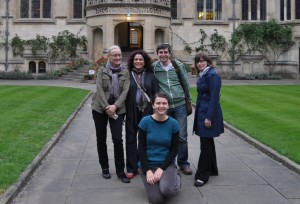In 2006, on the advice of a professor at Queen’s University, I began a second Masters degree in Studies in Comparative Literatures and Arts at Brock University. It was at there that I met Dr. Cristina Santos, who would become the supervisor of my research, and, although I am no longer at Brock, she has continued to mentor me.
When I left Brock, it was with scholarly skills I had developed only because Professor Santos encouraged me to push the boundaries of my research, to dig deeper into the questions I was considering, and to read texts closely, textually, hermeneutically.
Earlier this year, while I was teaching as a part-time instructor at Brock University, she encouraged me to submit an abstract for a conference at Oxford University. Writing abstracts for this particular conference was a key part of the course she was teaching – a course I had taken three years earlier. That course is to prepare students for an academic career: writing abstracts, writing lectures, writing articles.
Needless to say, I submitted an abstract which was later accepted by the conference committee, and, thanks to the good advice of my mentor, I travelled to Oxford University where I presented my current research. But I didn’t travel alone. When I arrived at Oxford, I realized that I was accompanied by several of Professor Santos’ students, and we were all participating in a conference that she had encouraged us all to attend.
The lessons of mentorship, as I have learned, extend far beyond the one or two years we spend at a university. As Cristina Santos demonstrates by her exceptional example, mentorship extends far beyond the one or two years we study with a supervisor. Mentorship is a continued commitment to students and their scholarship.

